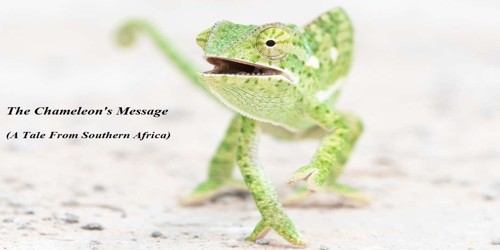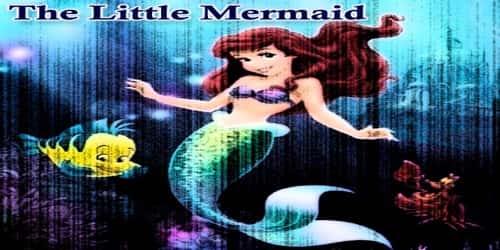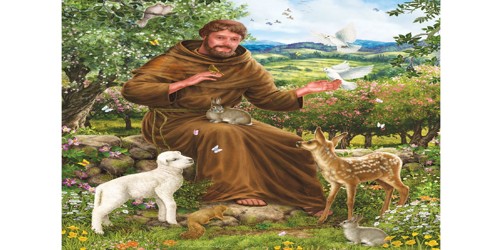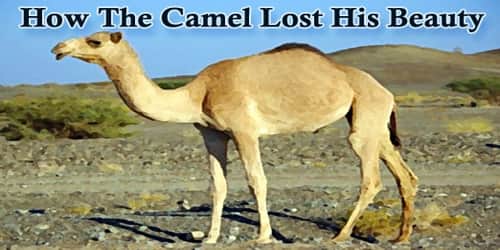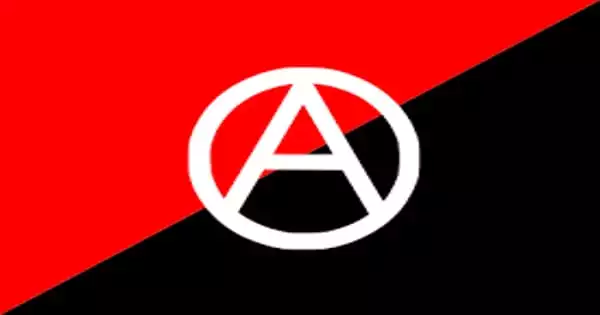The scene is a conservatory. Luxuriant tropical plants are seen looming through a greenish aquarium twilight, punctuated here and thereby the surprising pink of several Chinese lanterns hanging from the roof or on the branches of trees, while a warm yellow radiance stream out from the ball-room by a door on the left of the scene. Through the glass of the conservatory, at the back of the stage, one perceives a black-and-white landscape under the moon expanses of snow, lined and dotted with coal-black hedges and trees. Outside is frost and death: but within the conservatory, all is palpitating and steaming with tropical life and heat. Enormous fantastic plants encumber it; trees, creepers that writhe with serpentine life, orchids of every kind. Everywhere dense vegetation; horrible flowers that look like bottled spiders, like suppurating wounds; flowers with eyes and tongues, with moving, sensitive tentacles, with breasts and teeth and spotted skins.
The strains of a waltz float in through the ball-room door, and to that slow, soft music there enter, in parallel processions, the two families which are respectively Mr. Aston J. Tyrrell and Miss Topsy Garrick.
The doyen of the Tyrrell family is a young and perhaps too cultured literary man with rather long, dark brown hair, a face well cut and sensitive, if a trifle weak about the lower jaw, and a voice whose exquisite modulations could only be the product of education at one of the two Great Universities. We will call him plain Aston. Miss Topsy, the head of the Garrick family, is a young woman of not quite twenty, with sleek, yellow hair hanging, like a page’s, short and thick about her ears; boyish, too, in her slenderness and length of leg boyish, but feminine and attractive to the last degree. Miss Topsy paints charmingly, sings in a small, pure voice that twists the heart and makes the bowels yearn in the hearing of it, is well educated, and has read, or at least heard of, most of the best books in three languages, knows something, too, of economics and the doctrines of Freud.
They enter arm in arm, fresh from the dance, trailing behind them with their disengaged hands two absurd ventriloquist’s dummies of themselves. They sit down on a bench placed in the middle of the stage under a kind of arbour festooned with fabulous flowers. The other members of the two families lurk in the tropical twilight of the background.
Aston advances his dummy and makes it speak, moving its mouth and limbs appropriately by means of the secret levers which his hand controls.
ASTON’S DUMMY.
What a perfect floor it is to-night!
TOPSY’S DUMMY.
Yes, it’s like ice, isn’t it? And such a good band.
ASTON’S DUMMY.
Oh yes, a very good band.
TOPSY’S DUMMY.
They play at dinner-time at the Necropole, you know.
ASTON’S DUMMY.
Really! (A long, uncomfortable silence.)
(From under a lofty twangum tree emerges the figure of CAIN WASHINGTON TYRRELL, ASTON’S negro brother for the TYRRELL’S, I regret to say, have a lick of the tar-brush in them and CAIN is a Mendelian throwback to the pure Jamaican type. CAIN is stout and his blackface shines with grease. The whites of his eyes are like enamel, his smile is chryselephantine. He is dressed in a faultless evening dress and a ribbon of seals tinkles on his stomach. He walks with legs wide apart, the upper part of his body thrown back and his belly projecting, as though he were supporting the weight of an Aristophanic actor’s costume. He struts up and down in front of the couple on the seat, grinning and slapping himself on the waistcoat.)
CAIN.
What hair, nyum nyum! And the nape of her neck; and her body how slender! And what lovely movements, nyum nyum! (Approaching ASTON and speaking into his ear.) Eh? eh? eh?
ASTON.
Go away, you pig. Go away. (He holds up his dummy as a shield: CAIN retires discomfited.)
ASTON’S DUMMY.
Have you read any amusing novels lately?
TOPSY.
(Speaking over the head of her dummy.) No; I never read novels. They are mostly so frightful, aren’t they?
ASTON.
(Enthusiastically.) How splendid! Neither do I. I only write them sometimes, that’s all. (They abandon their dummies, which fall limply into one another’s arms and collapse on to the floor with an expiring sigh.)
TOPSY.
You write them? I didn’t know…
ASTON.
Oh, I’d very much rather you didn’t know. I shouldn’t like you ever to read one of them. They’re all awful: still, they keep the pot boiling, you know. But tell me, what do you read?
TOPSY.
Mostly history, and philosophy, and a little criticism and psychology, and lots of poetry.
ASTON.
My dear young lady! how wonderful, how altogether unexpectedly splendid. (CAIN emerges with the third brother, SIR JASPER, who is a paler, thinner, more sinister and aristocratic ASTON.)
CAIN.
Nyum nyum nyum…
SIR JASPER.
What a perfect sentence that was of yours, Aston: quite Henry Jamesian! “My dear young lady” as though you were forty years her senior; and the rare old-worldliness of that “altogether unexpectedly splendid”! Admirable. I don’t remember your ever employing quite exactly this opening gambit before: but of course, there were things very like it. (To CAIN.) What a nasty spectacle you are, Cain, gnashing your teeth like that!
CAIN.
Nyum nyum nyum.
(ASTON and TOPSY are enthusiastically talking about books: the two brothers, finding themselves quite unnoticed, retire into the shade of their twangum tree. BELLE GARRICK has been hovering behind TOPSY for some time past. She is more obviously pretty than her sister, full-bosomed and with a loose, red, laughing mouth. Unable to attract TOPSY’S attention, she turns round and calls, “HENRIKA.” A pale face with wide, surprised eyes peeps round the trunk, hairy like a mammoth’s leg, of a kadapoo tree with magenta leaves and flame-colored blossoms. This is HENRIKA, TOPSY’S youngest sister. She is dressed in a little white muslin frock set off with blue ribbons.)
HENRIKA.
(Tiptoes forward.) Here I am; what is it? I was rather frightened of that man. But he really seems quite nice and tame, doesn’t he?
BELLE.
Of course, he is! What a goose you are to hide like that!
HENRIKA.
He seems a nice, quiet, gentleman; and so clever.
BELLE.
What good hands he has, hasn’t he? (Approaching TOPSY and whispering in her ear.) Your hair’s going into your eyes, my dear. Toss it back in that pretty way you have. (TOPSY tosses her head; the soft, golden bell of hair quivers elastically about her ears.) That’s right!
CAIN.
(Bounding into the air and landing with feet apart, knees bent, and a hand on either knee.) Oh, nyum nyum!
ASTON.
Oh, the beauty of that movement! It simply makes one catch one’s breath with surprised pleasure, as the gesture of a perfect dancer might.
SIR JASPER.
Beautiful, wasn’t it? a pleasure purely æsthetic and æsthetically pure. Listen to Cain.
ASTON.
(To TOPSY.) And do you ever try writing yourself? I’m sure you ought to.
SIR JASPER.
Yes, yes, we’re sure you ought to. Eh, Cain?
TOPSY.
Well, I have written a little poetry or rather a few bad verses at one time or another.
ASTON.
Really now! What about, may I ask?
TOPSY.
Well… (hesitating) about different things, you know. (She fans herself rather nervously.)
BELLE.
(Leaning over TOPSY’S shoulder and addressing ASTON directly.) Mostly about Love. (She dwells long and voluptuously on the last word, pronouncing it “lovv” rather than “luvv.”)
CAIN.
Oh, dat’s good, dat’s good; dat’s dam good. (In moments of emotion CAIN’S manners and language savour more obviously than usual of the Old Plantation.) Did yoh see her face den?
BELLE.
(Repeats, slowly and solemnly.) Mostly about Love.
HENRIKA.
Oh, oh. (She covers her face with her hands.) How could you? It makes me tingle all over. (She runs behind the kadapoo tree again.)
ASTON.
(Very seriously and intelligently.) Really. That’s very interesting. I wish you’d let me see what you’ve done some time.
SIR JASPER.
We always like to see these things, don’t we, Aston? Do you remember Mrs. Towler? How pretty she was! And the way we criticized her literary productions…
ASTON.
Mrs. Towler… (He shudders as though he had touched something soft and filthy.) Oh, don’t, Jasper, don’t!
SIR JASPER.
Dear Mrs. Towler! We were very nice about her poems, weren’t we? Do you remember the one that began:
“My Love is like a silvern flower-de-luce
Within some wondrous dream-garden pent:
God made my lovely lily not for use,
But for an ornament.”
Even Cain, I believe, saw the joke of that.
ASTON.
Mrs. Towler oh, my God! But this is quite different: this girl really interests me.
SIR JASPER.
Oh yes, I know, I know. She interests you too, Cain, doesn’t she?
CAIN.
(Prances two or three steps of a cake-walk and sings.) Oh, ma honey, oh, ma honey.
ASTON.
But, I tell you, this is quite different.
SIR JASPER.
Of course it is. Any fool could see that it was. I’ve admitted it already.
ASTON.
(To TOPSY.) You will show them me, won’t you? I should so much like to see them.
TOPSY.
(Covered with confusion.) No, I really couldn’t. You’re a professional, you see.
HENRIKA.
(From behind the kadapoo tree.) No, you mustn’t show them to him. They’re really mine, you know, a great many of them.
BELLE.
Nonsense! (She stoops down and moves TOPSY’S foot in such a way that a very well-shaped, white-stockinged leg is visible some way up the calf. Then, to TOPSY.) Pull your skirt down, my dear. You’re quite indecent.
CAIN.
(Putting up his monocle.) Oh, nyum nyum, ma honey! Come wid me to Dixie Land…
SIR JASPER.
H’m, a little conscious, don’t you think?
ASTON.
But even professionals are human, my dear young lady. And perhaps I might be able to give you some help with your writings.
TOPSY.
That’s awfully kind of you, Mr. Tyrrell.
HENRIKA.
Oh, don’t let him see them. I don’t want him to. Don’t let him.
ASTON.
(With heavy charm.) It always interests me so much when I hear of the young and I trust you won’t be offended if I include you in their number when I hear of the young taking to writing. It is one of the most important duties that we of the older generation can perform to help and encourage the young with their work. It’s a great service to the cause of Art.
SIR JASPER.
That was what I was always saying to Mrs. Towler, if I remember rightly.
TOPSY.
I can’t tell you, Mr. Tyrrell, how delightful it is to have one’s work taken seriously. I am so grateful to you. May I send you my little efforts, then?
CAIN.
(Executes a step dance to the furious clicking of a pair of bones.)
SIR JASPER.
I congratulate you, Aston. A most masterful bit of strategy.
BELLE.
I wonder what he’ll do next. Isn’t it exciting? Topsy, toss your head again. That’s right. Oh, I wish something would happen!
HENRIKA.
What have you done? Oh, Topsy, you really mustn’t send him my poems.
BELLE.
You said he was such a nice man just now.
HENRIKA.
Oh yes, he’s nice, I know. But then he’s a man, you must admit that. I don’t want him to see them.
TOPSY.
(Firmly.) You’re being merely foolish, Henrika. Mr. Tyrrell, a very distinguished literary man, has been kind enough to take an interest in my work. His criticism will be the greatest help to me.
BELLE.
Of course it will, and he has such charming eyes. (A pause. The music, which has, all this while, been faintly heard through the ball-room door, becomes more audible. They are playing a rich, creamy waltz.) What delicious music! Henrika, come and have a dance. (She seizes HENRIKA round the waist and begins to waltz. HENRIKA is reluctant at first, but little by little the rhythm of the dance takes possession of her till, with her half-closed eyes and languorous, trance-like movements, she might figure as the visible living symbol of the waltz. ASTON and TOPSY lean back in their seats, marking the time with a languid beating of the hand. CAIN sways and swoons and revolves in his own peculiar and inimitable version of the dance.)
SIR JASPER.
(Who has been watching the whole scene with amusement.) What a pretty spectacle! “Music hath charms…”
HENRIKA.
(In an almost extinct voice.) Oh, Belle, Belle, I could go on dancing like this forever. I feel quite intoxicated with it.
TOPSY.
(To ASTON.) What a jolly tune this is!
ASTON.
Isn’t it? It’s called “Dreams of Desire,” I believe.
BELLE.
What a pretty name!
TOPSY.
These are wonderful flowers here.
ASTON.
Let’s go and have a look at them.
(They get up and walk round the conservatory. The flowers light up as they pass; in the midst of each is a small electric globe.)
ASTON.
This purple one with eyes is the assafœtida flower. Don’t put your nose too near; it has a smell like burning flesh. This is a Cypripedium from Sumatra. It is the only man-eating flower in the world. Notice its double set of teeth. (He puts a stick into the mouth of the flower, which instantly snaps to, like a steel trap.) Nasty, vicious brute! These blossoms like purple sponges belong to the twangum tree; when you squeeze them they ooze blood. This is the Jonesia, the octopus of the floral world: each of its eight tentacles is armed with a sting capable of killing a horse. Now, this is a most interesting and instructive flower the patchouli bloom. It is perhaps the most striking example in nature of structural specialization brought about by Evolution. If only Darwin had lived to see the patchouli plant! You have heard of flowers specially adapting themselves to be fertilized by bees or butterflies or spiders and such-like? Well, this plant which grows in the forests of Guatemala can only be fertilized by English explorers. Observe the structure of the flower; at the base is a flat, projecting pan, containing the pistil; above it an overarching tube ending in a spout. On either side a small crevice about three-quarters of an inch in length may be discerned in the fleshy lobes of the calix. The English traveler seeing this plant is immediately struck by its resemblance to those penny-in-the-slot machines which provide scent for the public in the railway stations at home. Through sheer force of habit he takes a penny from his pocket and inserts it in one of the crevices or slots. Immediate result a jet of highly scented liquid pollen is discharged from the spout upon the pistil lying below, and the plant is fertilized. Could anything be more miraculous? And yet there are those who deny the existence of God. Poor fools!
TOPSY.
Wonderful! (Sniffing) What a good scent.
ASTON.
The purest patchouli.
BELLE.
How delicious! Oh, my dear… (She shuts her eyes in ecstasy.)
HENRIKA.
(Drowsily.) Delicious, delicious…
SIR JASPER.
I always like these rather canaille perfumes. Their effect is admirable.
ASTON.
This is the leopard-flower. Observe its spotted skin and its thorns like agate claws. This is the singing Alocusia Alocusia Cantatrix discovered by Humboldt during his second voyage to the Amazons. If you stroke its throat in the right place, it will begin to sing like a nightingale. Allow me. (He takes her by the wrist and guides her fingers towards the palpitating throat of a gigantic flower shaped like a gramophone trumpet. The Alocusia bursts into song; it has a voice like Caruso’s.)
CAIN.
Oh, nyum nyum! What a hand! Oh, ma honey. (He runs a thick black finger along TOPSY’S arm.)
TOPSY.
What a remarkable flower!
BELLE.
I wonder whether he stroked my arm like that by accident or on purpose.
HENRIKA.
(Gives a little shiver.) He’s touching me, he’s touching me! But somehow I feel so sleepy I can’t move.
TOPSY.
(She moves on towards the next flower: BELLE does not allow her to disengage her hand at once.) What a curious smell this one has!
ASTON.
Be careful, be careful! That’s the chloroform plant.
TOPSY.
Oh, I feel quite dizzy and faint. That smell and the heat… (She almost falls: ASTON puts out his arm and holds her up.)
ASTON.
Poor child!
CAIN.
Poh chile, poh chile! (He hovers round her, his hands almost touching her, trembling with excitement: his white eyeballs roll horribly.)
ASTON.
I’ll open the door. The air will make you feel better. (He opens the conservatory door, still supporting TOPSY with his right arm. The wind is heard, fearfully whistling: a flurry of snow blows into the conservatory. The flowers utter piercing screams of rage and fear; their lights flicker wildly; several turn perfectly black and drop on to the floor writhing in agony. The floral octopus agitates its tentacles; the twangum blooms drip blood; all the leaves of all the trees clap together with a dry, scaly sound.)
TOPSY.
(Faintly.) Thank you; that’s better.
ASTON.
(Closing the door.) Poor child! Come and sit down again; the chloroform flower is a real danger. (Much moved, he leads her back towards the seat.)
CAIN.
(Executes a war dance round the seated couple.) Poh chile, poh chile! Nyum nyum nyum.
SIR JASPER.
One perceives the well-known dangers of playing the Good Samaritan towards an afflicted member of the opposite sex. Pity has touched even our good Cain to tears.
BELLE.
Oh, I wonder what’s going to happen! It’s so exciting. I’m so glad Henrika’s gone to sleep.
TOPSY.
It was silly of me to go all faint like that.
ASTON.
I ought to have warned you in time of the chloroform flower.
BELLE.
But it’s such a lovely feeling now like being in a very hot bath with lots of verbena bath-salts, and hardly able to move with limpness, but just ever so comfortable and happy.
ASTON.
How do you feel now? I’m afraid you’re looking very pale. Poor child!
CAIN.
Poh chile, poh chile!
SIR JASPER.
I don’t know much about these things, but it seems to me, my dear Aston, that the moment has decidedly arrived.
ASTON.
I’m so sorry. You poor little thing . . . (He kisses her very gently on the forehead.)
BELLE.
A-a-h.
HENRIKA.
Oh! He kissed me: but he’s so kind and good, so kind and good. (She stirs and falls back again into her drowsy trance.)
CAIN.
Poh chile, poh chile! (He leans over ASTON’S shoulder and begins rudely kissing TOPSY’S trance-calm, parted lips. TOPSY opens her eyes and sees the black, greasy face, the chryselephantine smile, the pink, thick lips, the goggling eyeballs of white enamel. She screams. HENRIKA springs up and screams too. TOPSY slips on to the floor, and CAIN and ASTON are left face to face with HENRIKA, pale as death and with wide-open, terrified eyes. She is trembling in every limb.)
ASTON.
(Gives CAIN a push that sends him sprawling backward, and falls on his knees before the pathetic figure of HENRIKA.) Oh, I’m so sorry, I’m so sorry. What a beast I am! I don’t know what I can have been thinking of to do such a thing.
SIR JASPER.
My dear boy, I’m afraid you and Cain knew only too well what you were thinking of. Only too well . . .
ASTON.
Will you forgive me? I can’t forgive myself.
HENRIKA.
Oh, you hurt me, you frightened me so much. I can’t bear it. (She cries.)
ASTON.
O God! O God! (The tears start into his eyes also. He takes HENRIKA’S hand and begins to kiss it.) I’m so sorry, I’m so sorry.
SIR JASPER.
If you’re not very careful, Aston, you’ll have Cain to deal with again. (CAIN has picked himself up and is creeping stealthily towards the couple in the center of the conservatory.)
ASTON.
(Turning round.) Cain, you brute, go to hell! (CAIN slinks back.) Oh, will you forgive me for having been such a swine? What can I do?
TOPSY.
(Who has recovered her self-possession, rises to her feet and pushes HENRIKA into the background.) Thank you, it is really quite all right. I think it would be best to say no more about it, to forget what has happened.
ASTON.
Will you forgive me, then?
TOPSY.
Of course, of course. Please get up, Mr. Tyrrell.
ASTON.
(Climbing to his feet.) I can’t think how I ever came to be such a brute.
TOPSY.
(Coldly.) I thought we had agreed not to talk about this incident any further. (There is a silence.)
SIR JASPER.
Well, Aston? This has been rather fun.
BELLE.
I wish you hadn’t been quite so cold with him, Topsy. Poor man! He really is very sorry. One can see that.
HENRIKA.
But did you see that awful face? (She shudders and covers her eyes.)
ASTON.
(Picking up his dummy and manipulating it.) It is very hot in here, is it not? Shall we go back to the dancing-room?
TOPSY.
(Also takes up her dummy.) Yes, let us go back.
ASTON’S DUMMY.
Isn’t that “Roses in Picardy” that the band is playing?
TOPSY’S DUMMY.
I believe it is. What a very good band, don’t you think?
ASTON’S DUMMY.
Yes; it plays during dinner, you know, at the Necropole. (To JASPER.) Lord, what a fool I am! I’d quite forgotten; it was she who told me so as we came in.
TOPSY’S DUMMY.
At the Necropole? Really.
ASTON’S DUMMY.
A very good band and a very good floor.
TOPSY’S DUMMY.
Yes, it’s a perfect floor, isn’t it? Like glass. . . . (They go out, followed by their respective families. BELLE supports HENRIKA, who is still very weak after her shock.)
BELLE.
How exciting it was, wasn’t it, Henrika?
HENRIKA.
Wasn’t it awful too awful! Oh, that face. . . . (CAIN follows ASTON out in silence and dejection. SIR JASPER brings up the rear of the procession. His face wears its usual expression of slightly bored amusement. He lights a cigarette.)
SIR JASPER.
Charming evening, charming evening… Now it’s over, I wonder whether it ever existed. (He goes out. The conservatory is left empty. The flowers flash their luminous pistils; the eyes of the assafœtida blossoms solemnly wink; leaves shake and sway and rustle; several of the flowers are heard to utter a low chuckle, while the Alocusia, after whistling a few derisive notes, finally utters a loud, gross Oriental hiccough.)
THE CURTAIN SLOWLY DESCENDS.
Written by Aldous Huxley

